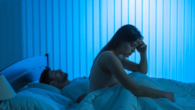
How to restore sleep: only scientifically proven methods
0
Hunge, go hiking and don't lie down if you don't sleep.
It doesn't matter what exactly the reasons are that led to the fact that you can't fall asleep and wake up at the desired time – a change in the time zone or insomnia. Only one thing is important: the sleep mode is quite realistic to normalize.
Here are some research-backed recommendations from experts at the authoritative medical resource WebMD.
1. Control the light
It's an obvious fact: we fall asleep when it's dark and wake up when it's light. The hormones melatonin and cortisol are responsible for this.
The first is produced in the pineal gland (epiphysis) only in conditions of darkness: the part of the brain that is responsible for the biological clock — the suprachiasmal nucleus in the hypothalamus — lights up the gland about it. Melatonin lowers body temperature, blood pressure, and blood glucose levels. Together, these processes force our body to hibernate. When it gets light again, the level of melatonin drops and drowsiness recedes.
The amount of cortisol, on the contrary, in conditions of darkness and an increase in the level of melatonin decreases. Less cortisol-less stress-deeper relaxation and easier sleep care.
If with darkness complexity, Melatonin is not produced in the required amount. And cortisol increases.
The conclusion is simple. If you want to fall asleep at the desired time, make your brain dark. Hang thick curtains on the windows, turn off all the lights and do not sit on social networks before going to bed. The last point is especially important.
2. Deny yourself daytime sleep
If you need to restore the routine, give up the siesta. Daytime sleep is highly likely to make it difficult to go to sleep.
Important point: if you feel so tired that you literally fall off your feet in the middle of the day, you can still take a nap. But try to devote no more than 20 minutes to it. And preferably by 3:00 p.m.
3. Don't just lie in bed
If you can't fall asleep for 20 minutes or more, get up and do something relaxing (breathe deeply, meditate, turn on dimmed lights, and read a book ), instead of looking at the ceiling.
Staying in bed, you train your brain that you can lie in the dark and not sleep. It risks becoming a bad habit.
4. Wake up at the same time every day
It is far from always possible to convince the body to fall asleep before the desired hour. But it is quite possible to plan your waking time.
By waking up at the same time every day, you set a rhythm for your body and thus adjust your biological clock to function according to a certain schedule.
5. Observe sleep hygiene
Here are some rules that will help you fall asleep at the desired time:
- Ensure silence. Close the windows and doors, try to prevent extraneous sounds from entering your bedroom. If that doesn't work, use a white noise generator.
- Sleep in a cool room. The ideal temperature is 15-19 °C.
- Avoid caffeinated drinks, especially in the afternoon. These include not only coffee and tea, but also all kinds of energy drinks and often even ordinary carbonated water.
- Make sure your bed is comfortable. A too soft (or vice versa – very hard) mattress and lumpy pillows lead to the fact that you will unconsciously turn around in bed in search of a more comfortable position. And these movements reduce the quality of sleep.
- Be sure to exercise during the day. Regular physical activity will increase your chances of a healthy vacation.
6. Do not eat before bed
The biological clock also responds to the diet. We eat during the day, we don't eat at night. Therefore, if you take food (or your gastrointestinal tract is busy actively digesting what you have eaten), the body thinks that it is still a day. So it's too early to fall asleep.
Try to eat no later than 2-3 hours before the expected bedtime.
An additional unpleasant effect: knowing that they are fed in the evening, the body will try to stay awake at this time tomorrow (the day after tomorrow and so on). Therefore, it would be good to make early dinners regular, so that the body gets used to it: there is nothing to wait for food late, it is better to sleep.
7. Try fasting
Scientists from Harvard discovered that animals' circadian rhythms (so-called internal biological rhythms of the body) shift depending on the availability of food. Based on this, researchers suggest that fasting for 12-16 hours can help with insomnia caused by jet lag – changing time zones.
To restore sleep, including without jet lag, try a 16-hour fast. For a few days, eat an early dinner (eg around 4pm) and then avoid eating until breakfast (around 8am the next morning). When the mode is normalized, switch to a 12-hour interval between dinner and breakfast. It is useful not only for sleep, but also for health in general.
8. Go camping
With backpacks and tents. At least for three days, but preferably for a week – to increase the effect.
The natural change of day and night helps to restore the body's circadian rhythms.
Yes, the study provides the results of testing this theory.
Eight participants of the experiment went on a hike, where they spent a week without artificial lighting, phones and laptops. During this period, the biological clocks of all volunteers were reset, synchronizing with solar time: people began to easily wake up at dawn and fall asleep at nightfall. This effect was most evident in those who, before the start of the experiment, positioned themselves as an owl.
9. Try sleep deprivation
Another effective, though rather controversial, way to restore your sleep pattern is to stay up for a full day. When the long-awaited evening finally arrives, you will surely fall asleep as soon as your head touches the pillow.
This method is, of course, tortuous. But the researchers managed to prove the connection between daily lack of sleep and the activation of a certain type of brain cells that produce the protein adenosine. It is extremely important for sleep regulation: a sufficient amount of adenosine helps to normalize the sleep-wake cycle.
Important nuances:
- Since the method is quite strict, it can only be used after consultation with a doctor — the same therapist.
- During the period of lack of sleep, refuse to drive a car and perform other tasks that require attention and concentration.
10. Talk to a therapist
It's normal to have trouble sleeping from time to time. In most cases, it is enough to change your lifestyle according to the list above – and you will start to sleep again.
However, if, despite all your efforts, insomnia and other discomforts persist, you should consult a therapist. You may have an undiagnosed sleep disorder. Such conditions require treatment – sometimes even medication.









Leave a Reply